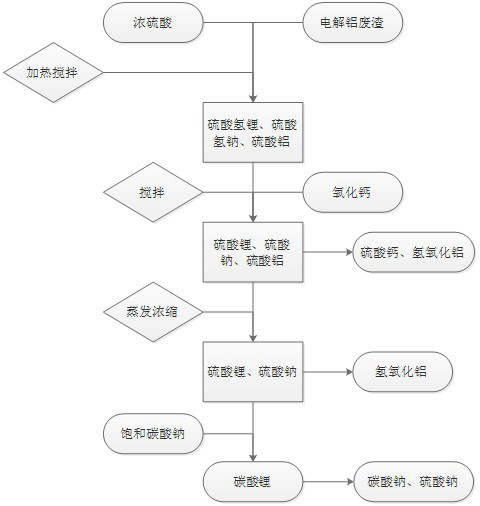A kind of extraction method of lithium in electrolytic aluminum waste slag
A technology of electrolytic aluminum waste residue and extraction method, applied in the field of lithium extraction, can solve the problems of increasing the use of carbon dioxide, increasing the cost of equipment input, reducing the extraction rate of lithium carbonate, etc., to reduce pollution, reduce investment in production equipment, and low cost of raw materials Effect
- Summary
- Abstract
- Description
- Claims
- Application Information
AI Technical Summary
Problems solved by technology
Method used
Image
Examples
Embodiment 1
[0039]A method for extracting lithium from electrolytic aluminum waste residue, the steps are as follows:
[0040]50kg of electrolytic aluminum waste residue from which carbon and iron have been removed is reacted with 100kg of concentrated sulfuric acid at a reaction temperature of 250°C. After 6 hours of reaction, mixture A is obtained. At the same time, water is used to absorb the HF produced by the reaction. The resulting HF aqueous solution can be used to prepare cryolite ;
[0041]Dissolve mixture A with 500 kg of water and filter to obtain filtrate B. Slowly add calcium oxide to filtrate B until the pH of the solution reaches 7.5. Filter the resulting solution to obtain filter residue C and filtrate D. The main component of filter residue C is hydroxide Aluminum and calcium sulfate, aluminum hydroxide can be used to prepare by-products such as cryolite, and calcium sulfate can be used to prepare by-products such as gypsum powder.
[0042]The filtrate D was heated to 90°C and concentra...
Embodiment 2
[0046]A method for extracting lithium from electrolytic aluminum waste residue, the steps are as follows:
[0047]50kg of electrolytic aluminum waste residue from which carbon and iron have been removed is reacted with 125kg of concentrated sulfuric acid at a reaction temperature of 100°C. After 20 hours of reaction, mixture A is obtained. At the same time, water is used to absorb the HF produced by the reaction. The resulting HF aqueous solution can be used to prepare cryolite ;
[0048]Dissolve mixture A with 500 kg of water and filter to obtain filtrate B. Slowly add calcium oxide to filtrate B until the pH value of the solution reaches 7. Filter the resulting solution to obtain filter residue C and filtrate D. The main component of filter residue C is hydroxide Aluminum and calcium sulfate, aluminum hydroxide can be used to prepare by-products such as cryolite, and calcium sulfate can be used to prepare by-products such as gypsum powder.
[0049]The filtrate D was heated to 60°C by evapo...
Embodiment 3
[0052]A method for extracting lithium from electrolytic aluminum waste residue, the steps are as follows:
[0053]50kg of electrolytic aluminum waste residue from which carbon and iron have been removed is reacted with 75kg of concentrated sulfuric acid at a reaction temperature of 300°C. After 6 hours of reaction, mixture A is obtained. At the same time, water is used to absorb the HF produced by the reaction. The resulting HF aqueous solution can be used to prepare cryolite ;
[0054]Dissolve mixture A with 500kg of water and filter to obtain filtrate B. Slowly add calcium oxide to filtrate B until the pH of the solution reaches 7.5. Filter the resulting solution to obtain filter residue C and filtrate D. The main component of filter residue C is hydroxide Aluminum and calcium sulfate, aluminum hydroxide can be used to prepare by-products such as cryolite, and calcium sulfate can be used to prepare by-products such as gypsum powder.
[0055]The filtrate D was heated to 99°C to be concentra...
PUM
 Login to View More
Login to View More Abstract
Description
Claims
Application Information
 Login to View More
Login to View More - R&D
- Intellectual Property
- Life Sciences
- Materials
- Tech Scout
- Unparalleled Data Quality
- Higher Quality Content
- 60% Fewer Hallucinations
Browse by: Latest US Patents, China's latest patents, Technical Efficacy Thesaurus, Application Domain, Technology Topic, Popular Technical Reports.
© 2025 PatSnap. All rights reserved.Legal|Privacy policy|Modern Slavery Act Transparency Statement|Sitemap|About US| Contact US: help@patsnap.com

